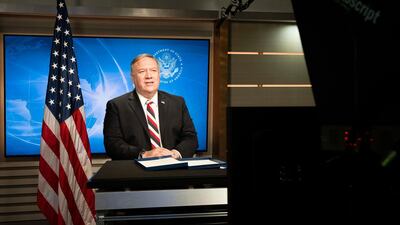The United Arab Emirates and the United States launched an inaugural strategic dialogue on Tuesday by signing a memorandum of understanding.
UAE Minister of State for Foreign Affairs Dr Anwar Gargash and US ambassador to the UAE John Rakolta Jr concluded the virtual launch of the strategic dialogue by signing the memorandum.
The memorandum focuses on enhancing UAE-US ties in eight key areas: politics, defence, law enforcement and border security, intelligence and counterterrorism, human rights, economics, culture and academics as well as space.
“The Trump administration prioritises this relationship so highly because our two peoples have demonstrated how much we can accomplish together – not just talk but action,” Secretary of State Mike Pompeo said before the signing.
“We, of course, remain engaged on a number of regional issues, including healing the rifts among Arab Gulf partners and advancing the cause of peace in Libya and Yemen.”
Mr Pompeo thanked the UAE for closely supporting the Trump administration’s Iran policies.
“We stand together on the international stage to counter the greatest destructive force in the Middle East: the Iranian regime,” said Mr Pompeo.
“I want to personally thank the UAE for its support of our maximum pressure campaign, which has denied Tehran access to weapons valued more than $70 million. We’re grateful for their help to hold the regime accountable at the United Nations.”
A decade-old UN arms embargo on Iran expired on Sunday despite US attempts to convince the Security Council to extend it.
Minister of Foreign Affairs and International Co-operation Sheikh Abdullah bin Zayed touted a 2009 civil nuclear agreement with the US – widely considered the “gold standard” agreement by nonproliferation experts – and contrasted it with Iran’s nuclear programme.
“We look at the nuclear concern of all of us in Iran, and we believe that the nuclear gold standard should be applied on Iran as well,” said Sheikh Abdullah.
"I hope that such a gold standard will remind us that this could be another moment of a gold standard of a relationship between the UAE and the United States.”
As the dialogue occurred in the run-up to the US election on November 3, US State Department Spokeswoman Morgan Ortagus was at pains to stress the positive relationship was bipartisan.
"It is important to note that the US-UAE relationship has never been defined by a single political party in the United States, it is deep and goes across both political parties in Washington," Ms Ortagus told The National on Tuesday.
But the US official argued that when Mr Trump came to office, the administration chose a different strategic approach to the Middle East from its predecessor the Obama administration.
“We did not feel that giving billions of dollars in sanctions relief to Iran would change their unchecked behaviour…so we sought a different approach to empower the UAE, Saudi Arabia and other Gulf partners and to empower the state of Israel.” The former Obama administration refutes the claim that it handed Iran billions of dollars through sanctions relief following the nuclear deal.
The inaugural US-UAE strategic dialogue came as US officials accompanied Emirati ministers to Israel to sign a series of separate deals on Tuesday as part of the Washington-brokered Abraham Accord, which lay the groundwork to normalise UAE-Israeli relations.
Israeli Prime Minister Benjamin Netanayhu greeted UAE Minister of Economy Abdulla bin Touq and Minister of State for Financial Affairs Obaid Al Tayer at Ben Gurion Airport. US Treasury Secretary Steve Mnuchin and the White House’s Israeli-Palestinian peace envoy, Avi Berkowitz, accompanied them.
The new UAE-Israel deals include visa-free travel and a $3 billion private sector investment fund.
Ms Ortagus said while the timing is not related to the signing of Abraham Accords related agreements in Israel also happening on Tuesday, they reflect the progress in the relationship.
“They’re two separate events although there has been such important progress in the relationship that everything seems to be coming along at the same time.”
Ms Ortagus said the strategic dialogue is an important opportunity to capitalise on the changing dynamics in the region and brings focus on the long term relationship for a “top tier ally.”
“With the UAE in particular, [the strategic dialogue] allows us to focus on the depth of the relationship…there is always talk about the military and security sides which is prolific but what gets overlooked is that we have eight different areas in the dialogue as a new framework for co-operation,” Ms Ortagus said.
She mentioned space exploration, human rights and economics as new growing fields of cooperation. The UAE built a mission to Mars and sent its first astronaut Hazza Al Mansoori and Sultan Al Neyadi to space in 2019 and 2020.

